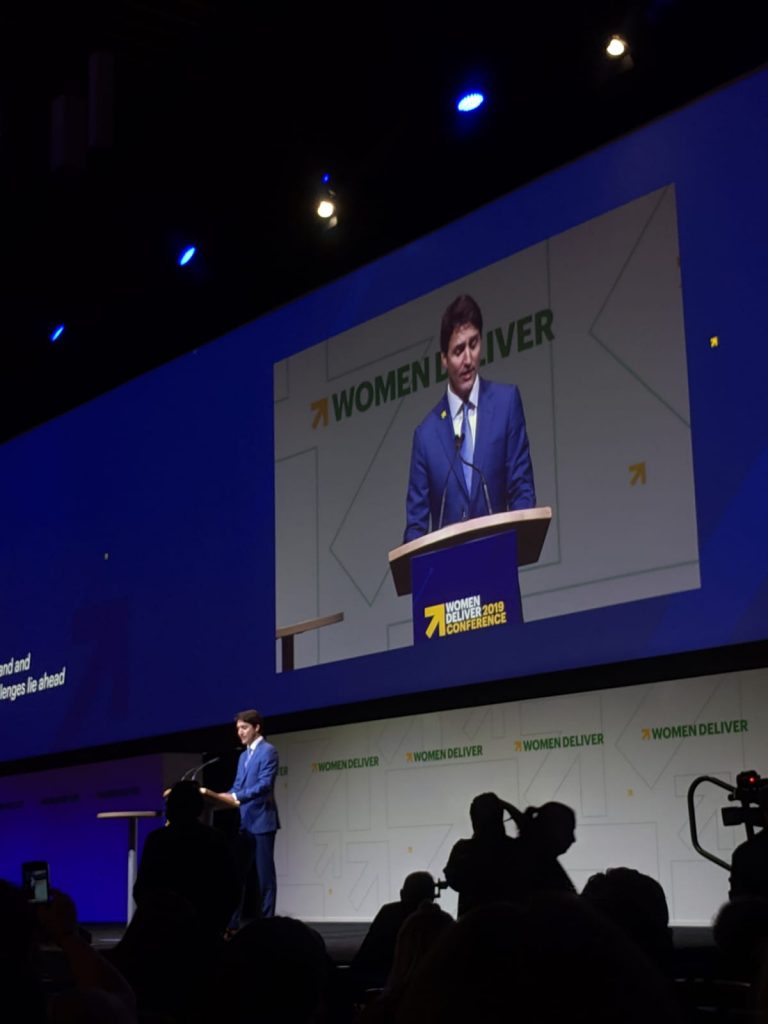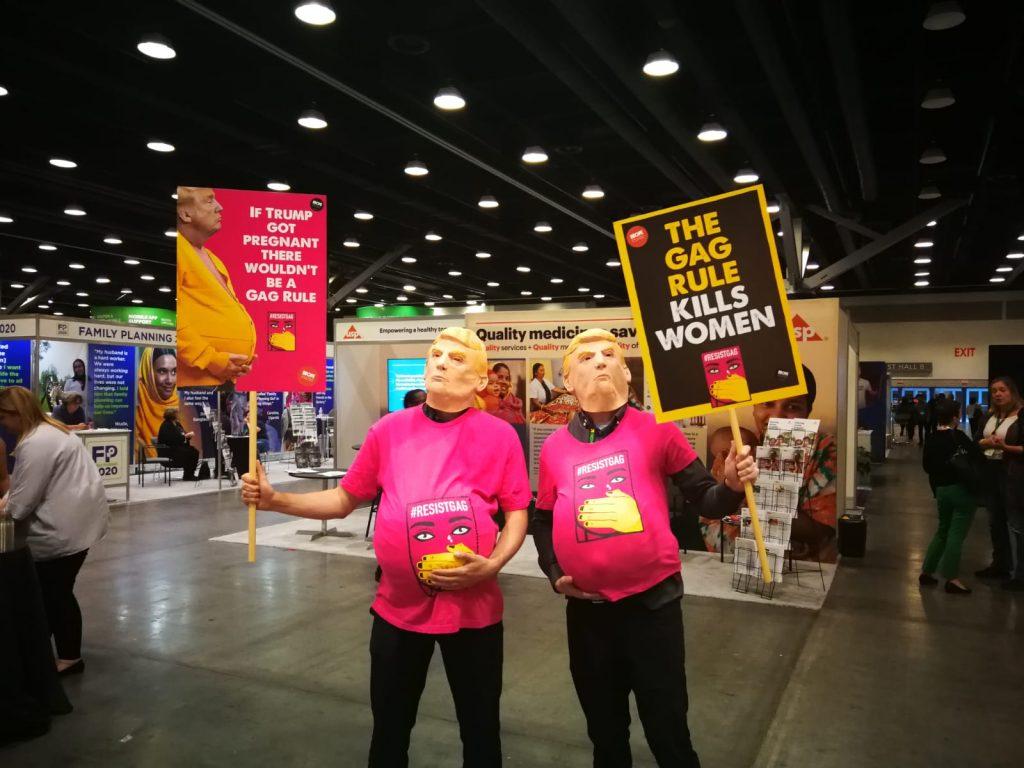When Kristof asked me whether I would like to write a piece on Women Deliver in Vancouver, I thought it would be easy. However, days before the largest conference on gender equality, when 8000 people from over 160 counties were landing in my city, the excitement turned into slight panic. If you have seen a glimpse of this programme, it spans from education rights, gender-based violence, 2SLGBTQ+* rights , sexual and reproductive rights, youth engagement, economic empowerment, women’s health, maternal health and much more. I began my sojourn into the programming from pre-conferences on Friday, and after attending many sessions, I have possibly only been able to capture a small fraction of the programming.
But when I was thinking of writing this piece, I heeded the very wise words of a facilitator at the ‘Nutsahmaht’, the indigenous women’s preconference on June 2, who quoting Carl Jung said, “What is most personal is most universal”. I am sure you can find many excellent summaries of the conference for your topic of interest and you can also (re-)watch the plenaries online. I am motivated to write about two key themes which resonated personally with me leading up to, and throughout the week. The time and place. Here I go!
The time
Yes, there has not been a better time. I do believe that we are in one of the most defining times in recent sociopolitical history. I believe that if, in recent years, there was a time to come together for women’s rights and gender equality– this is it. Having seen a sweeping regression on women’s sexual and reproductive health rights in the US, could there be a better time for people to come to gather and galvanize? With the #MeToo, and TimesUp Movements having taken a stronghold since the last Women Deliver conference (Copenhagen, 2016), I was ready for a cathartic experience. I looked upon Women Deliver to wash away the patriarchy like devotees in India look to the Ganges.
To be honest, I have drawn inspiration from this gathering at some critical junctures in my professional life. At my first Women Deliver in 2013 (Kuala Lumpur, Malaysia), at 22 years old, I met Hans Rosling in person, saw what speaking truth to power looks like with Kavita Ramdas (now Ford foundation, previously former President and CEO of the Global Fund for Women ) and Theo Sowa (CEO of the African Women’s Development Fund), and found myself in some high-level sessions I had no business attending. Being surrounded by really smart, passionate and eloquent people for four days in 2013 inspired me to apply for my Masters in Global Health Policy, and I wrote my admissions essays on the flight from Malaysia to Canada, feeling that I had so much to learn.
So yes, Women Deliver has had a very formative impact on me. But at the time, and then again in 2016, nothing invoked a more visceral reaction in me than the argument I heard over and over again by the conference stating that investing in women is ‘smart’ since the economic dividends to countries are huge – read for example (2010) “Investing in girls and women is not only the right thing to do, but it makes economic sense”. This hurt every rights-based approach bone in my body.
Thankfully, I heard the poorly phrased economic investment argument only once during the last week which is a huge testament to how the discourse has evolved.
The place
Vancouver is a place I have had the privilege of making my home for exactly half my life so far (the other half in India). For those among you who attended the HSR symposium in November 2016, I hate to break it to you but the weather last week was gorgeous- sunny, warm and no rain in sight. That aside, it is no secret that Canada has a dark history rooted in colonialism, resulting in social displacement of the Indigenous people. Indigenous health disparities in Canada are unacceptable with higher rates of maternal mortality, trauma, interpersonal and domestic violence, and suicide.
Two historic moments lined up during the week of Women Deliver.
First, on 3rd of June, a long national inquiry launched in 2016 into thousands of missing and murdered Indigenous women and girls came to light and the final verdict called the crisis a “genocide.” The report is comprised of testimonies of 2,380 family members, survivors of violence, experts and Knowledge Keepers. The 1200 page report is titled “ “Reclaiming Power and Place: The Final Report of the National Inquiry into Missing and Murdered Indigenous Women and Girls”.
This is historic.
While the twenty-one recommendations resulting from the report call for tangible changes, by accepting this as a “genocide” the Canadian federal government has taken the first step to acknowledge that specific colonial and patriarchal policies displaced women from their traditional roles in communities and governance and that this multigenerational and intergenerational trauma marginalized indigenous women and girls, leaving them vulnerable to violence.
Second, on 4th June, Canadian Prime Justin Trudeau announced that Canada will increase its spending to 1.4 billion Canadian dollars ($1 billion) by 2023 from C$1.1 billion currently in funding to support women’s sexual and reproductive health, and this yearly. Hon. Maryam Monsef, the minister of international development announced 300M for the ‘Global Equality Fund” to support women’s rights organisations in Canada and beyond. Combined, these funds have made Canada the largest funder for women’s sexual and reproductive health and gender equality.

Given the Global Gag rule imposed again by President Trump in the first few days of his office, almost $9 billion in U.S. foreign aid is at stake, requiring ‘foreign nongovernmental organizations that receive certain categories of U.S. foreign assistance from using their own, non-U.S. funds to provide abortion services, counseling or referrals, or to advocate for the liberalization of abortion laws, except in cases of rape, incest, and life endangerment of the pregnant woman’. As reported during Women Deliver, people are dying right now because of this.
Against this dire backdrop, I found myself on my feet, clapping and cheering on these Canadian announcements. This is what I was waiting for- not tokenist announcements, but politicians in leadership who unequivocally support advancing gender equality and stop politicizing women’s rights. I guess I was having a bit of cathartic experience after all.
The Power of You
After a week of intense conferencing, I am slightly depleted in energy but far more energized in my resolve. However, the all-too familiar feeling of whether we have achieved something tangible has started to surface. While my experience is just that- mine and singular, I am heartened with the community that comes together for this conference. While we have not been emancipated from patriarchy as I had wished, I would be remiss to say that I do not gain inspiration from many in this community.
Over the last two years, I have been attempting to be reflexive of the work I have done in maternal health so far. This honest deliberation has prompted me to pivot my career path from academia to a place where I am determined to make a difference. In all my interactions, I cannot imagine achieving any level of health parity without creating avenues for economic parity. I also have realized my growing restlessness with drafting, creating and appraising evidence but not seeing effective scale up of what-works. In the increasing competition for in-country resources in the places where I have worked, I have realized that discussing evidence to scale cannot happen without an understanding of domestic health financing, political windows of opportunity, and engaging private sector effectively. While at Women Deliver then, I attended every possible session on financial inclusion of women, providing catalytic funding to women’s funds, and creating economic empowerment through a gendered approach. I am completely naïve to this area so I welcome any resources and insights, but I have come to believe that the gender norms that affected women’s right to health are the same that hinder access to economic empowerment.
On the same, watching the likes of Tarana Burke on stage (“Power of Movements”), I was reminded that vulnerability is the birthplace of love, belonging, joy, courage, empathy and creativity (as said by the lovely Brene Brown), and perhaps a gender equal word cannot happen without the courage to share our own stories.
After all, as Carl Jung said ‘What is personal is most universal’.
